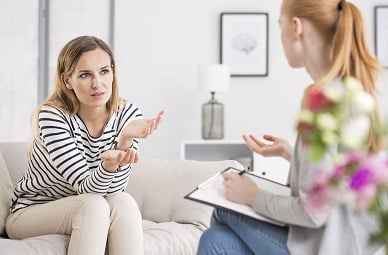How a licensed therapist for anxiety can help you overcome daily stress
How a licensed therapist for anxiety can help you overcome daily stress
Blog Article
Checking Out Various Methods in Therapy for Anxiety Disorder for Enduring Adjustment
When taking on stress and anxiety conditions, it's necessary to check out a range of therapy approaches. Each approach offers unique insights and tools to aid you handle your signs and symptoms properly. You could discover that integrating strategies can generate the finest outcomes. Comprehending the nuances of these methods is crucial to cultivating long-term change. What happens if the appropriate combination could launch a brand-new level of emotional well-being for you?
Understanding Anxiety Disorders: A Brief Summary
Anxiety conditions, which influence millions of people worldwide, can substantially affect day-to-day live. You might experience frustrating sensations of anxiety or fret that appear irrepressible. These feelings can cause physical symptoms like an auto racing heart, sweating, or even lightheadedness. Common types of anxiousness disorders include generalised anxiety condition, panic attack, and social anxiety disorder. Each has unique indicators, but they all share a tendency to interrupt your routine and relationships.Understanding the origin of your stress and anxiety is vital. It may stem from genes, mind chemistry, or life experiences. Identifying your triggers can assist you handle your actions better. It is necessary to bear in mind that you're not the only one in this struggle. Lots of people deal with comparable difficulties, and seeking aid is a solid step toward feeling better. By learning regarding anxiousness problems, you're already on the path to understanding and handling your condition better.
Cognitive-Behavioral Therapy: Testing Negative Idea Patterns

Determining Adverse Thought Triggers
Identifying the certain triggers behind your adverse ideas can be essential in managing anxiety when you come across moments of distress. Start by focusing on circumstances that prompt feelings of fear or worry. Is it a congested space, a forthcoming target date, or a conversation with certain people? Jot down these circumstances in a journal. This will certainly assist you identify patterns in your reasoning. Notice physical experiences that accompany your adverse thoughts, like a racing heart or rigidity in your upper body. By identifying these triggers, you gain understanding right into what's sustaining your stress and anxiety. Recognizing these connections is the initial step in testing those thoughts and inevitably regaining control over your emotional feedbacks.

Replacing Thoughts With Positives
Testing unfavorable thought patterns is a vital action in transforming your state of mind and minimizing anxiety. You might typically locate on your own caught in cycles of self-doubt or tragic thinking. Rather than letting these ideas dictate your sensations, practice replacing them with sensible choices or positive affirmations. When you believe, "I can not handle this," change it to, "I can take care of difficulties one step at a time." This straightforward change can greatly influence your psychological state. On a regular basis recognizing and countering these negative ideas aids develop a much healthier inner dialogue. Bear in mind, it takes some time and initiative, yet continually exercising this technique can result in enduring modification, encouraging you to encounter anxiety with restored confidence and strength
Structure Coping Approaches Together
Changing unfavorable thoughts is only the beginning of managing anxiousness efficiently. To develop long-term change, you require to develop coping techniques that encourage you. Cognitive-Behavioral Therapy (CBT) helps you recognize and test those unhelpful idea patterns. With each other, you and your counselor can explore exactly how these thoughts impact your sensations and behaviors.Start by creating practical strategies, like journaling or mindfulness exercises, that permit you to confront stress and anxiety head-on. When you encounter your fears progressively, you'll discover to respond in different ways.

Mindfulness and Acceptance-Based Approaches: Cultivating Present-Moment Recognition
As you navigate the complexities of anxiousness, incorporating mindfulness and acceptance-based approaches can considerably enhance your capacity to grow present-moment awareness. By focusing on the here and currently, you'll locate that you can observe your ideas and sensations without judgment. This technique aids you recognize your stress and anxiety without feeling bewildered by it.Engaging in mindfulness exercises, such as deep breathing, body scans, or guided meditations, enables you to ground on your own in your existing experience. Acceptance-based techniques encourage you to welcome your emotions as opposed to combat against them. When you accept your feelings, they lose their power over you.Incorporating these methods right into your daily routine can transform how you reply to anxiety. You'll create durability and discover to browse demanding circumstances with better convenience. Inevitably, growing present-moment recognition lays the structure for long lasting modification, empowering you to lead a more fulfilling life.
Exposure Therapy: Challenging Anxieties Gradually
Exposure therapy aids you challenge your worries in a steady way, making it less frustrating. You'll learn strategies to face anxiety-provoking situations detailed, while likewise constructing coping techniques to handle your responses. This approach encourages you to take control and lower anxiety in time.
Steady Exposure Methods
When facing anxiety, slowly confronting your worries can be an effective means to restore control. This method, called steady exposure, involves slowly subjecting yourself to the situations or things that activate your anxiety. Beginning with much less daunting circumstances and slowly work your way approximately even more tough ones. For example, if you hesitate of public talking, you could start by speaking before a mirror, after that progress to sharing ideas with a pal, and at some point resolve a small group. Each action helps desensitize you to the worry, developing your confidence gradually. Keep in mind, it's necessary to speed yourself and commemorate small victories as you move through this procedure, reinforcing your capacity to manage anxiety successfully.
Building Coping Strategies
Structure effective coping methods is necessary for taking care of anxiety, specifically as you challenge your worries slowly. One powerful technique is exposure treatment, where you begin by encountering your concerns in a controlled manner. Begin with less frightening circumstances and gradually function your method up to more challenging circumstances. This gradual direct exposure assists desensitize you to anxiousness causes, making them much less overwhelming.Incorporate relaxation methods, such as deep breathing or mindfulness, to relax your mind during exposure. Track your development, celebrating tiny triumphes along the means to improve your confidence. Keep in mind, it's all right to take your time; the goal isn't perfection however consistent improvement. By constructing these techniques, you'll empower on your own to browse anxiousness and accept life extra totally.
Psychodynamic Therapy: Discovering Source of Anxiousness
Psychodynamic treatment explores the subconscious mind, revealing the origin of your anxiety - Counseling services for anxiety. By examining your thoughts, feelings, and previous experiences, this strategy helps click here you uncover underlying conflicts and unsettled problems that may add to your existing stress and anxiety. You'll deal with a specialist to investigate childhood experiences, connections, and emotional patterns that form your feedbacks today.As you gain understanding into these much deeper layers of your subconscious, you'll begin to identify how previous occasions affect your present behavior. This understanding can result in catharsis, enabling you to process feelings you could have suppressed.Through the healing connection, you can likewise recognize defense devices that might have established over time, providing a clearer course to alter. Eventually, psychodynamic treatment furnishes you with the devices to address your stress and anxiety at its core, advertising long-term makeover in your emotional wellness
Holistic and integrative Approaches: Combining Methods for Greater Efficiency
Incorporating numerous restorative methods can improve your journey towards handling anxiousness better. By combining components from cognitive-behavioral treatment, mindfulness methods, and holistic approaches, you can develop a tailored technique that addresses your unique requirements. You may use cognitive-behavioral strategies to challenge adverse thought patterns while including mindfulness exercises to ground on your own in the present moment.Additionally, discovering alternative practices such as yoga or meditation can advertise relaxation and reduce anxiety signs and symptoms. This mix allows you to create higher self-awareness and resilience.Experimenting with these varied approaches can help you uncover what reverberates most with you. Bear in mind, it has to do with finding a harmony that functions, rather than sticking to a single technique. This integrative strategy not just offers instant relief yet also promotes long-lasting skills for taking care of stress and anxiety, empowering you to reclaim control over your life.
The Function of Assistance Solutions: Building Strength Through Connection
While it might seem that taking care of anxiousness is a solitary journey, having a solid assistance system can play a necessary role in your durability. Surrounding yourself with understanding close friends, household, or assistance teams develops a secure space where you can honestly share your experiences and sensations. When you attach with others, you remind on your own that you're not alone in this struggle.These connections use motivation and can supply functional coping techniques that have actually helped others. It's additionally a possibility to obtain viewpoint; friends can help you see scenarios differently, decreasing feelings of isolation.Moreover, psychological assistance fosters a feeling of belonging, which can substantially alleviate anxiousness signs. By leaning on your support group, you can develop durability and take on obstacles better. Bear in mind, connecting for assistance signifies toughness, and it can make all the distinction in your trip towards taking care of stress and anxiety.
Frequently Asked Inquiries
What Are the Typical Signs of Anxiety Problems?
You could experience restlessness, exhaustion, trouble concentrating, irritation, muscle mass stress, and sleep disruptions. Physical signs can include fast heart beat, sweating, and trembling. Identifying these indications early can aid you seek appropriate support and therapy.

How Long Does Therapy Usually Last for Anxiety Problems?
Treatment for stress and anxiety problems typically lasts anywhere from a few weeks to a number of months. It really relies on your specific needs, progression, and the techniques your specialist uses to help you handle your anxiety properly.
Can Medication Be Utilized Alongside Treatment for Anxiety?
Yes, medication can most definitely be utilized along with therapy for anxiousness. Incorporating both methods often boosts treatment performance, helping you handle signs while exploring underlying problems via counseling. Always consult your health care company for personalized advice.
Exist Self-Help Strategies for Taking Care Of Anxiousness?
Yes, there are numerous self-help methods for handling stress and anxiety. You can practice mindfulness, take part in regular exercise, maintain a well balanced diet regimen, develop a routine, and utilize deep breathing methods to help in reducing stress and anxiety signs effectively.
How Do I Know if I Need Expert Assistance for Stress And Anxiety?
You should consider looking for expert assistance for anxiousness if it interferes with day-to-day live, creates substantial distress, or if self-help strategies aren't working. Trust your instincts; connecting can lead to far better coping skills and support. Common kinds of anxiousness conditions include generalised anxiety problem, panic problem, and social stress and anxiety disorder. When you come across minutes of distress, identifying the particular triggers behind your adverse ideas can be necessary in taking care of anxiousness. Replacing unfavorable thoughts is only the beginning of taking care of stress and anxiety efficiently. By analyzing your thoughts, sensations, and past experiences, this strategy aids you uncover underlying conflicts and unsolved concerns that may add to your current anxiety. It's additionally a possibility to gain perspective; friends can help you see scenarios in a different way, lowering sensations of isolation (Counseling services for anxiety).Moreover, emotional support cultivates a sense of belonging, which can significantly minimize anxiousness signs
Report this page